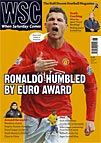 A spate of death threats, with bullets sent in the post, is hurting the image of football in Holland. Derek Brookman reports
A spate of death threats, with bullets sent in the post, is hurting the image of football in Holland. Derek Brookman reports
Many people, if asked to choose an appropriate adjective for Dutch society, would plump for “tolerant”. We all know about the views on prostitution and soft drugs, and the country also has a centuries-old tradition of welcoming those deemed not to conform elsewhere.
However, tolerance clearly wasn’t uppermost in the mind of the 42-year-old man who threatened to kill Johan Derksen, editor of Voetbal International magazine, if he attended Willem II’s match with Feyenoord in Tilburg on October 19. The matter was taken so seriously that Derksen was advised not to attend – advice he followed. The man was arrested, although the motives for his apparent rage are still unclear.
This was not an isolated incident. Derksen says that he receives approximately 100 intimidating emails every day and has had numerous death threats in the past, two of which resulted in him being given police protection. Nor is he alone in this. Over the years, scores of high-profile figures in the Dutch media have also been intimidated.
One possible explanation – though in no way a justification – for why such explicit threats of violence occur, is that people such as Derksen bring it upon themselves. He is abrasive and provocative, just like Hugo Borst, another football TV talking head who has received similar threats. Not for them the innocuous Match of the Day-style admonitions and wry smiles about poor defending. These are people who regularly tear into players, coaches, clubs and whoever else they think isn’t cutting the mustard.
Their attacks can be personal and stinging. In just one online column, Derksen called Volendam keeper Jeroen Verhoeven “extremely poor, a bag of spuds who now and again manages to prevent a goal”, described another goalie, Feyenoord’s Henk Timmer, as “obsessed with the cameras, only getting himself noticed through strange theatricals and high-school-like dramatics”, and addressed someone who had mailed him a question with “Tom, thanks for your stupid mail about FC Utrecht, you don’t understand anything”. In that respect, it shouldn’t be too surprising that some take the criticism of themselves, their favourite team or player so seriously that they react aggressively.
Yet Mart Smeets, the patriarch of Dutch sports journalism (a sort of Des Lynam of the polders), is anything but controversial; his greatest “crime” is occasionally being too smug and hogging the limelight during interviews. He too has received death threats by post and even been attacked in the street. Other relatively innocuous TV presenters have also been targeted.
Nor is this treatment limited to media figures. In August 2002, having recently returned to coach PSV after guiding South Korea to the World Cup semi-finals, Guus Hiddink was the recipient of an infamous kogelbrief – a bullet in the post. Another one arrived in October of the same year. Frank Rijkaard (then managing Sparta Rotterdam), Bert van Marwijk (Feyenoord) and Henk Kessler (director of the Dutch FA) got one too. Then, in 2004, Hiddink’s parents were sent a letter saying that their son’s house would be petrol-bombed if he signed any players from Ajax, at a time when he was reportedly interested in bringing Rafael van der Vaart to Eindhoven. Even leaving the country hasn’t offered complete respite, as family members were repeatedly threatened after a Hiddink-inspired Russia knocked Holland out of Euro 2008.
How can things go so awry? This is, after all, a country where inclusiveness is a core value and everyone is allowed to express their views. But this may also be a cause of the problem. If you promote the notion that everyone should be able to speak their mind and express themselves, then you run the risk of a small minority doing so in a way that is dangerous. Derksen himself tried to introduce a sense of perspective, saying: “It’s not as if I’m discussing major political issues, I’m talking about a keeper who maybe lets in a soft goal. It’s ultimately meaningless.” The fact that prominent football figures are too often put in fear of their lives shows that, sadly, others don’t always see it that way.
From WSC 263 January 2009